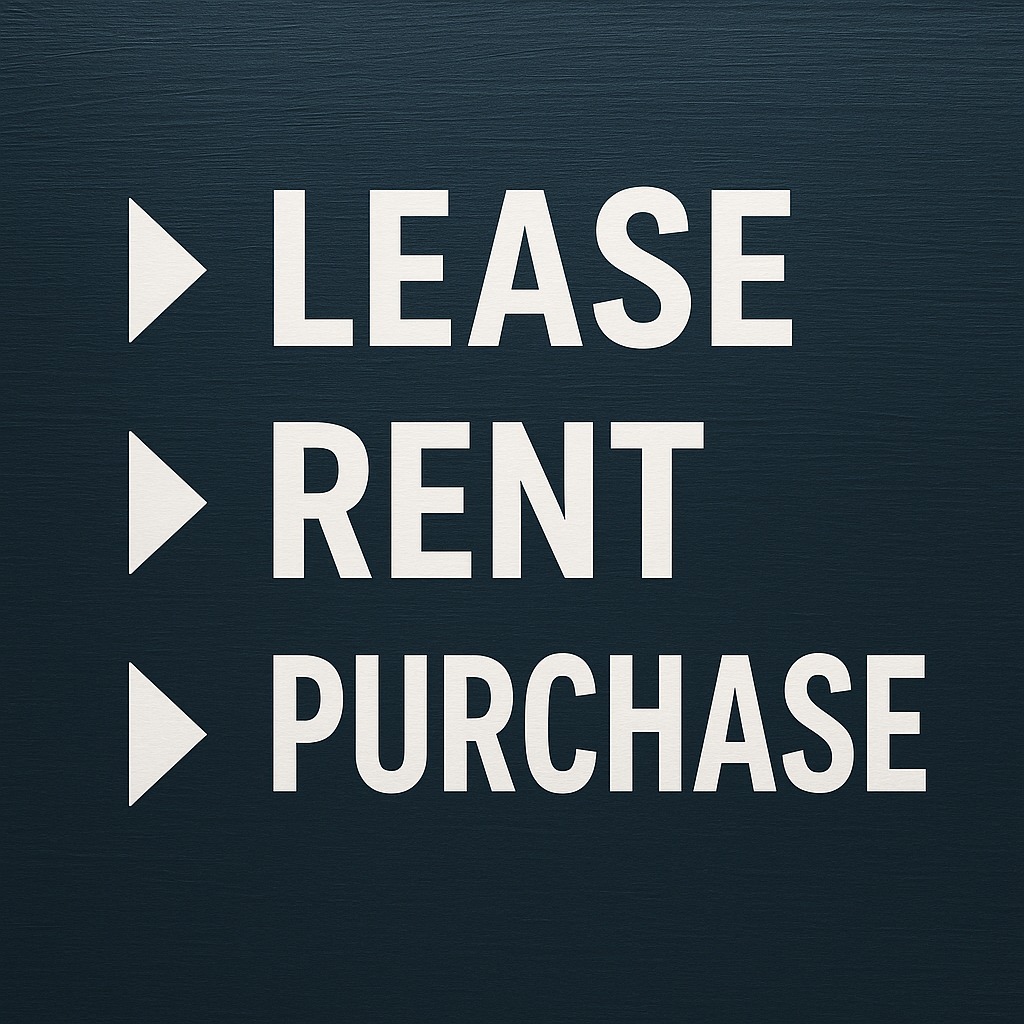Rental vs Lease vs Purchase: Choosing the Right Way to Acquire Commercial Laundry & Catering Equipment
When investing in commercial laundry and catering equipment, businesses often face an important choice: rent, lease, or buy? Each route has its own pros and cons depending on your goals, cash flow, and how you want to manage support and maintenance.
In this guide, we’ll explain the key differences between rental, leasing, and purchasing, highlight what’s included (like installation and breakdown cover), and dive into the UK tax implications—so you can make the best decision for your business.
1. Rental: Maximum Flexibility, Zero Hassle
What is it?
Rental allows you to use top-quality commercial equipment for a fixed monthly fee, typically over 5 years. You don’t own the equipment, but installation and full breakdown cover are included—and if the machine breaks beyond economical repair, it’s replaced free of charge.
Key Features:
- No upfront capital needed
- Fixed monthly cost
- Installation included
- Full breakdown and repair cover
- Free replacement for machines deemed beyond economical repair
- Short to medium-term contracts
UK Tax Implications:
- ✅ Fully deductible as an operating expense
Rental payments can be deducted from your taxable profits, reducing Corporation Tax. - 💡 Note: Rental equipment is typically off-balance-sheet, improving key financial ratios.
Best for:
- Startups or cash-flow-conscious businesses
- Operators who want to avoid repair costs
- Sites where equipment is used heavily and may need frequent servicing
2. Lease: Long-Term Access with Ownership Potential
What is it?
Leasing offers long-term use of equipment over 3 to 5 years. Like rental, installation and full breakdown cover are included. At the end of the term, you usually have the option to buy the equipment for a nominal fee.
Key Features:
- Affordable monthly payments
- Installation included
- Full breakdown and repair cover
- Option to own the equipment at the end
- Typically 3–5 year agreement
UK Tax Implications:
- ✅ Operating lease: Payments are tax-deductible as business expenses.
- ✅ Finance lease: You may be able to claim capital allowances on the asset.
- 💡 Note: Depending on the lease structure, equipment may or may not appear on your balance sheet.
Best for:
- Businesses with stable operations and long-term plans
- Companies seeking equipment ownership without upfront costs
- Operators wanting predictable costs and professional support
3. Purchase: Full Ownership and Control
What is it?
Buying means you own the equipment from day one. You’ll need to cover installation and repairs yourself, unless you opt for a separate maintenance plan.
Key Features:
- Full asset ownership
- No ongoing rental or lease payments
- Installation not included by default (can be added at extra cost)
- Responsibility for servicing, repairs, and replacement
UK Tax Implications:
- ✅ Capital allowances available
Under the Annual Investment Allowance (AIA), you may be able to deduct up to £1 million of eligible equipment investment from your profits in the tax year of purchase. - ❌ Ongoing maintenance and repairs must be funded by you
Best for:
- Businesses with strong capital reserves
- Long-term, low-risk operations where full control is preferred
- Sites with in-house maintenance teams
Comparison Summary
|
Criteria |
Rental |
Lease |
Purchase |
|
Upfront Cost |
None / Low |
None / Low |
High |
|
Monthly Payment |
Yes |
Yes |
No |
|
Ownership |
No |
Option at end |
Yes |
|
Installation Included |
✅ Yes |
✅ Yes |
❌ No (extra cost) |
|
Breakdown Cover |
✅ Yes |
✅ Yes |
❌ No (optional) |
|
Replacement if Irreparable |
✅ Free replacement |
❌ (Repair covered only) |
❌ (At owner’s expense) |
|
Tax Treatment (UK) |
Fully deductible expense |
Expense or capital allowances¹ |
Capital allowances (AIA) |
|
Balance Sheet Impact |
Off-balance-sheet |
Depends on lease type |
On-balance-sheet |
|
Best For |
Flexibility & low risk |
Long-term access & support |
Long-term control & ownership |
¹ Depending on whether it is an operating or finance lease.
Final Thoughts
Here’s the short version:
- Rental: Zero hassle, full support, and total flexibility. If the machine dies, you get a replacement—free.
- Lease: Longer-term savings and eventual ownership, with the same great support.
- Purchase: Great for businesses that want control, already have capital, and can handle their own servicing.
With both rental and lease, you benefit from professional installation and comprehensive breakdown cover—so your equipment is always ready to perform, without surprise costs.
